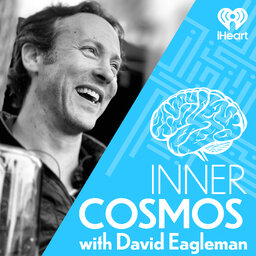Ep 81 "How close are we to longevity?"
Two certainties are death and taxes; a third is that people will work hard to avoid them both. But why is it so difficult to extend our lifespan? We know how to do it in worms and mice; why is it tricky in humans? Why do so few companies study longevity? What does the near future hold? What would it be like if everyone lived a much longer life? Join Eagleman this week with longevity expert Martin Borch Jensen to discuss the hopes and challenges of longevity science.
In 1 playlist(s)
Inner Cosmos with David Eagleman
Neuroscientist and author David Eagleman discusses how our brain interprets the world and what that …Social links
Follow podcast
Recent clips

Ep141 "What do brains and weather systems have in common?" with Nicole Rust
36:41

Ep140 "How does your brain decide what’s true?" with Sam Harris
1:20:32

Ep139 "What does alignment look like in a society of AIs?" with Danielle Perszyk
58:23
 Inner Cosmos with David Eagleman
Inner Cosmos with David Eagleman